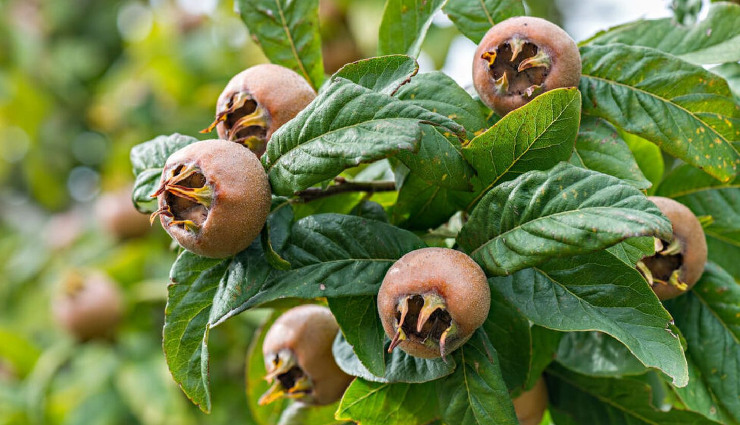- Home›
- Healthy Living›
- 7 Least Known About Medlar Fruit
7 Least Known About Medlar Fruit
By: Priyanka Maheshwari Thu, 30 Nov 2023 6:31:51

Medlar fruit, scientifically known as Mespilus germanica, is a unique and lesser-known fruit that has been cultivated for centuries. Belonging to the Rosaceae family, the same family as apples and pears, medlar fruit is native to regions of Southeastern Europe and Western Asia. This deciduous tree bears small, brownish fruits that are distinct in both appearance and taste.
The medlar fruit has a peculiar shape, resembling a small, russet apple with a calyx at the base. What sets it apart is its unusual ripening process, known as "bletting." Unlike many fruits that are enjoyed fresh off the tree, medlars are typically harvested while still hard and unripe. They undergo a process of bletting, during which the fruit softens and develops a unique, rich flavor and aroma. This transformation is crucial for making the fruit palatable.
Once bletted, the medlar fruit takes on a soft, creamy texture and a flavor that combines elements of apple and pear with a hint of spiciness. The taste is often described as sweet and slightly tangy. In addition to being consumed fresh, medlars can be used in various culinary applications, such as jams, jellies, and desserts.
Historically, medlar fruit has been appreciated for its medicinal properties as well. It was believed to have health benefits, and its use dates back to ancient times. While it is not as widely cultivated as some other fruits, the medlar has experienced a resurgence in interest among enthusiasts and chefs interested in unique and heritage varieties.

# Rich in Vitamins and Minerals
Medlar fruit contains various vitamins and minerals, including vitamin C, vitamin A, potassium, iron, and dietary fiber. These nutrients are essential for overall health and well-being.

# Antioxidant Properties
Like many fruits, medlar contains antioxidants that help neutralize harmful free radicals in the body. Antioxidants play a role in reducing oxidative stress and inflammation, which are associated with various chronic diseases.

# Digestive Health
The dietary fiber in medlar fruit may contribute to digestive health by promoting regular bowel movements and preventing constipation. Fiber also supports a healthy gut microbiota.

# Immune System Support
The presence of vitamin C in medlar fruit is beneficial for the immune system. Vitamin C is known for its role in supporting the body's defenses against infections and illnesses.

# Heart Health
The potassium content in medlar may contribute to heart health by helping to regulate blood pressure. Potassium is a vital mineral that supports proper cardiovascular function.

# Weight Management
The fiber in medlar can contribute to a feeling of fullness, potentially aiding in weight management by reducing overall calorie intake.

# Anti-Inflammatory Properties
Some compounds found in medlar fruit may have anti-inflammatory properties, which could be beneficial for conditions related to inflammation.





